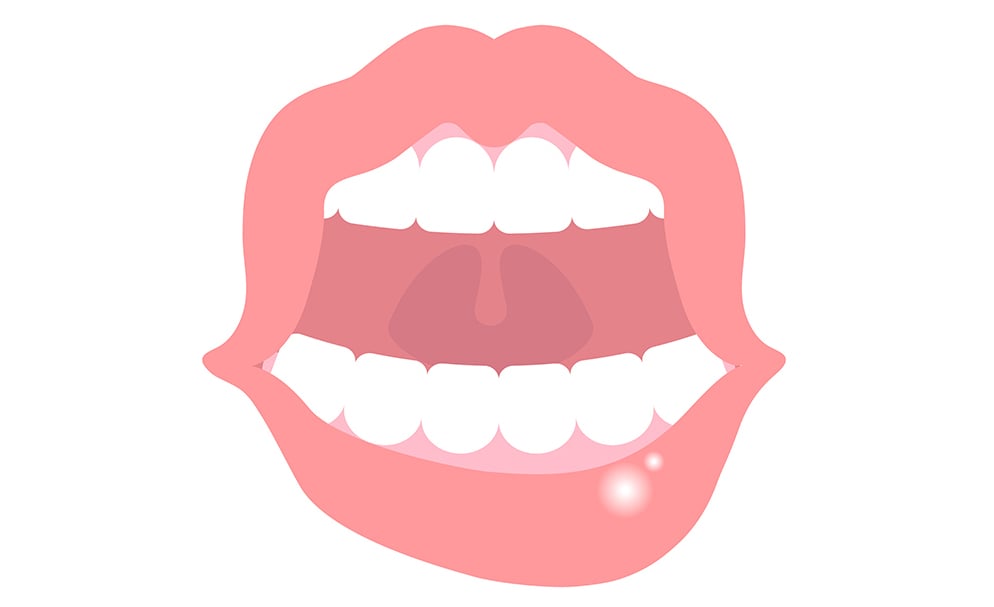Mouth ulcers are also known as canker sores, and they are ordinarily small and irritating lesions that can develop in the mouth or at the base of the gums. When suffering from mouth ulcers, one can find daily activities like eating, drinking or talking quite uncomfortable.¹
This condition can occur more commonly in people with a family history of mouth ulcers, rendering them at higher risk of developing mouth ulcers. Let’s learn more about mouth ulcers, their symptoms and how to treat them efficiently!¹
What are mouth ulcers or canker sores?
Mouth ulcers are not contagious and will typically fade within one to two weeks from first noticing their appearance. In some cases, however, you can find yourself struggling with a mouth ulcer or canker sore that is larger in size and extremely painful. In the case of painful, larger or longer-lasting mouth ulcers, it is recommended that you seek expert help and advice from a doctor.¹
What causes mouth ulcers?
While there are no particular causes of mouth ulcers, there are many factors that can trigger their development. Here are some of the most common factors that you can identify in relation to mouth ulcers. Canker sores can develop as a result of:
What are the main causes of Canker Sores?
Essential nutrient deficiency, especially zinc, folate, iron or B-12.
Increased emotional stress or fatigue due to lack of sleep.
An allergic response to bacteria or sensitivity to acidic foods.
A symptom of viral, bacterial or fungal infections.
An injury from hard, aggressive brushing, dental work or physical accident.
Severe conditions like diabetes mellitus, celiac disease or a malfunctioning immune system disorder.
Hormonal changes in women, especially during menstruation.
Behcet’s disease, which is a condition that causes inflammation.
Damaging the gums using a toothbrush or irritating toothpaste.
Poorly fitting dentures, sharp teeth, braces or rough fillings.¹
How to deal with minor mouth ulcers?
Minor canker sores are small ulcers that usually heal on their own within two weeks with leaving scars. They don’t typically indicate a serious issue unless accompanied by other symptoms that we will explore later on.
Here are some things you should do or avoid to help speed up the mouth ulcers healing process and reduce discomfort:
Use a soft-bristled toothbrush and arrange regular dental check-ups.
Rinse using an antimicrobial mouthwash to reduce swelling or inflammation.³
Eat a healthy and balanced diet avoiding spicy, too salty and acidic foods.
Drink cool drinks using a straw and avoid hot beverages or acidic juices.
Don’t use toothpaste containing sodium lauryl sulphate.³
Eat softer food and avoid crunchy food items like chips, toast or nuts.
Rinse with salt water.
Take nutrients like vitamin B-6, vitamin B-12, iron and zinc.¹
How to prevent canker sores?
You can follow simple steps to reduce the appearance of mouth ulcers, like avoiding foods that generally irritate you.² A healthy and well-balanced diet that contains whole grains and alkaline fruits and vegetables can help you avoid mouth ulcers. It’s also important to check if you have any vitamin deficiencies and take daily multivitamins.¹
And like any other mouth diseases or irritations, maintaining good oral hygiene can significantly prove helpful in mouth ulcers prevention. Make sure you follow a daily oral hygiene routine that includes using LISTERINE Mouthwash products to prevent canker sores and a host of other mouth conditions.
It is recommended by dentists that use of an alcohol-free mouthwash is essential in preventing canker sores as it helps the mouth from drying out, kills bacteria and thereby decreasing the likelyhood of developing canker sores.⁴
When should I see a doctor to treat mouth ulcers?
While most mouth ulcers are harmless and heal with the help of some good practices that we mentioned above, a long-lasting mouth ulcer can be a sign of a serious condition. It’s recommended to get canker sores or mouth ulcers checked by a dentist or GP in any of these cases:
The mouth ulcer is large.
The sores persist for more than two or three weeks.
Diarrhoea or a high fever that co-occurs with canker sores appearance.
Severe discomfort when eating, drinking or swallowing.
Uncontrollable pain that over-the-counter medicines and pain-killers can not alleviate.
If mouth ulcers extend to the lips or near the back of your throat.
Canker sores developing without pain.
Bleeding and extreme redness
The appearance of new mouth ulcers before the existing ones heal.²
Sources:
